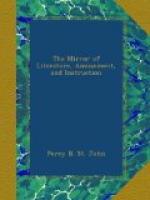Of the misery of human life, Gray speaks in similar terms:
“To all their sufferings all are
men,
Condemn’d alike to groan,
The feeling for another’s pain,
The unfeeling for his own.”
Audi alteram partem:
“It’s a happy world after all.”—Paley.
And Gray himself:
“For who to dumb forgetfulness a
prey,
This careful, anxious being
e’er resigned,
E’er left the precincts of the cheerful
day
Nor cast one longing, lingering
look behind.”
And another popular author:
“A world of pleasure
is continually streaming in on every side. It
only depends on man to be
a demi-god, and to convert this world
into Elysium.”—Gaieties
and Gravities.
It is doubtless wise to incline to the latter sentiment.
Of the instability of human happiness and glory, a fine picture is drawn by Appian, who represents Scipio weeping over the destruction of Carthage. “When he saw this famous city, which had flourished seven hundred years, and might have been compared to the greatest empires, on account of the extent of its dominions, both by sea and land, its mighty armies, its fleets, elephants and riches; and that the Carthaginians were even superior to other nations, by their courage and greatness of soul, as, notwithstanding their being deprived of arms and ships, they had sustained for three whole years, all the hardships and calamities of a long siege; seeing, I say, this city entirely ruined, historians relate that he could not refuse his tears to the unhappy fate of Carthage. He reflected that cities, nations, and empires are liable to revolutions, no less than particular men; that the like sad fate had befallen Troy, once so powerful; and in later times, the Assyrians, Medes, and Persians, whose dominions were once of so great an extent; and lastly, the Macedonians, whose empire had been so glorious throughout the world.” Full of these mournful ideas, he repeated the following verse of Homer:
“The day shall come, that great
avenging day,
Which Troy’s proud glories in the
dust shall lay,
When Priam’s powers, and Priam’s
self shall fall,
And one prodigious ruin swallow all—”
thereby denouncing the future destiny of Rome, as he himself confessed to Polybius, who desired Scipio to explain himself on that occasion.
* * * * *
THE SKETCH-BOOK
* * * * *
A COASTING SCRAP.
(For the Mirror.)




